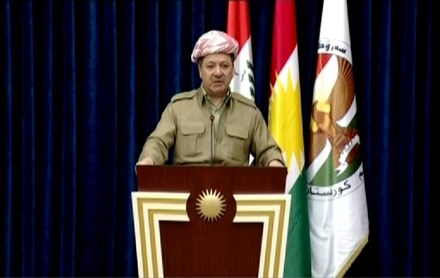Are Kurds really treated equally in Iran?
Dr. Majid Rafizadeh/Al Arabiya/June 17/16
While the West mainly views Iran through the prism of the nuclear deal – reached between P5+1 and the Islamic Republic – as well as the resulting trade deals, the rights of Iran’s Kurds have been neglected by the international community and mainstream media. Typically Iranian presidents run their campaign on a platform with the slogan that they will not discriminate against the Kurds and Iran’s Kurdistan. Iran’s President, Hassan Rowhani, said last year that choosing Kurdistan province as the first place to visit right after the nuclear deal with the West shows the importance of Kurdistan and its people during the Islamic Revolution and their role in protecting Iran. “Iran protects Erbil and Baghdad just as it protects Iranian Kurdistan. Without Iran’s help Erbil and Baghdad would be in the hands of terrorist groups right now. Just as we protect Sanandaj we also protect Sulaimani and Duhok,” Rowhani said, adding that “Sunni and Shiite are all brothers, we are all equal…Kurdistan is the eye of Iran.”But, are the Kurds really treated equally? Are Sunnis and Shiites equal in the Islamic Republic? And have Iranian presidents, including the conservative moderate, Hassan Rowhani, fulfilled and kept their promises?
The nuclear agreement and Western appeasement policies toward it have enhanced Iran’s legitimacy which is helping its leaders to more forcefully suppress the aspirations of Kurds
Heightened tensions
Iran has roughly twelve million Kurds making up approximately 15 percent of the population. Majority of Kurds live in Kurdistan, located in the northwestern area of Iran near the border of Iraq. The Iranian leaders’ treatment and view of Kurds in Iraq and Turkey might be slightly different from that of Kurds in Iran. Tehran has attempted to increase its influence in Iraq and Turkey – as well as increasing its leverage against Ankara in order to force it to reshape its policies opposing the Islamic Republic- by economically, politically, and militarily building an alliance with some Kurdish groups, such as the Patriotic Union of Kurdistan (PUK), which is located mainly in the south and east of the Kurdistan region of Iraq. Iran remains opposed to independent Kurdish states in Turkey and Iraq fearing it might inspire Iranian Kurds to do the same.Nevertheless, the story is different when it comes to Kurds in Iran. Recently, Iran’s powerful Revolutionary Guard Corps (IRGC) killed five members of a Kurdish separatist group in western Iran, according to Iran’s state media.
Few weeks ago, the Iranian government executed five Kurdish rights activists in the northwestern city of Urmia. The five Kurds – Naji Kiwan, Ali Kurdian, Haidar Ramini, Nadir Muhamadi and Ruhman Rashidi – were reportedly hung publicly on charges of “conspiring against the Islamic Republic of Iran”.“The victims were human rights activists who used to document violations by Iranian security forces against civilians in the Kurdish city of Urmia,” Dara Natiq, a member of the Kurdistan Democratic Party in Iran, told ARA News. According to reports, the Iranian government executes approximately seven Kurdish civilians and activists every week.No robust condemnation or criticism has been issued by the US or European nations and the issue has been largely neglected.
After the establishment of the Islamic Republic in 1979, Iranian authorities have been very effective in suppressing the Kurds and silencing any dissent or opposition. First of all, due to their military capabilities, hard power superiority and harsh punishments such as executions, Iranian leaders have been successful in cracking down on Kurdish democratic aspirations, human rights activists, political activists, and opposition groups. Around 10,000 Kurds have been reportedly killed or executed and roughly 20,000 displaced following the Islamic revolution of Iran. Through the use of military force, some of the powerful opposition groups – such as the Kurdistan Democratic Party of Iran (KDPI) – have been pushed out of Iran to Iraq. Secondly, the Iranian government has neglected the Kurdistan region thus preventing the majority of the Kurdish population from prospering financially. Third, from a cultural, religious, and ethnic point of view, the Kurdish minority has long suffered discrimination- being viewed with suspicion, and considered outsiders or foreign conspirators.The 2015-16 Amnesty International report says that “Iran’s disadvantaged ethnic groups, including Ahwazi Arabs, Azerbaijani Turks, Baluchis, Kurds and Turkmen, continued to report that the state authorities systematically discriminated against them, particularly in employment, housing, access to political office, and the exercise of cultural, civil and political rights.”“They remained unable to use their own language as a medium of instruction for primary education. Those who called for greater cultural and linguistic rights faced arrest, imprisonment, and in some cases the death penalty. Security forces disproportionately repressed protests by ethnic minorities including Ahwazi Arabs, Azerbaijani Turks and Kurds,” the report says. The international community, and particularly the West, has ignored Iran’s use of brute force against the Kurds. The nuclear agreement and the Western appeasement policies toward Iran have enhanced Iran’s legitimacy which is consequently assisting Iranian leaders to more forcefully and effectively suppress the aspirations of Kurds and permits cracking down on domestic Kurdish opposition with brutal force.






















